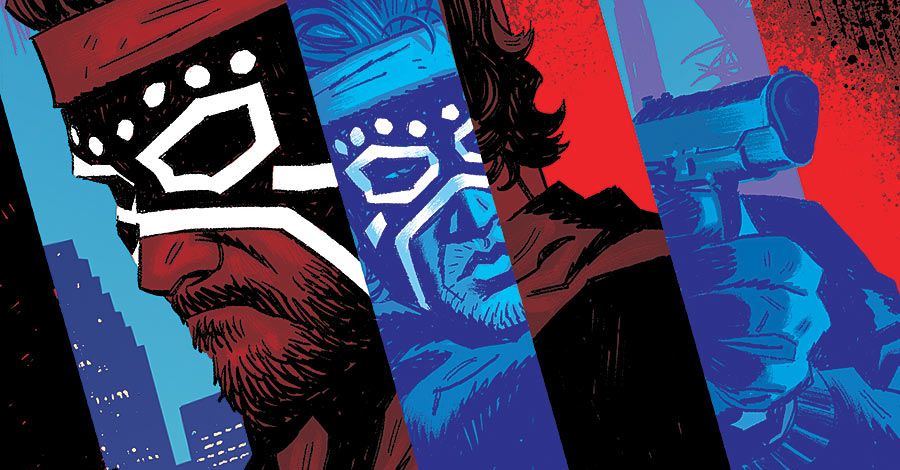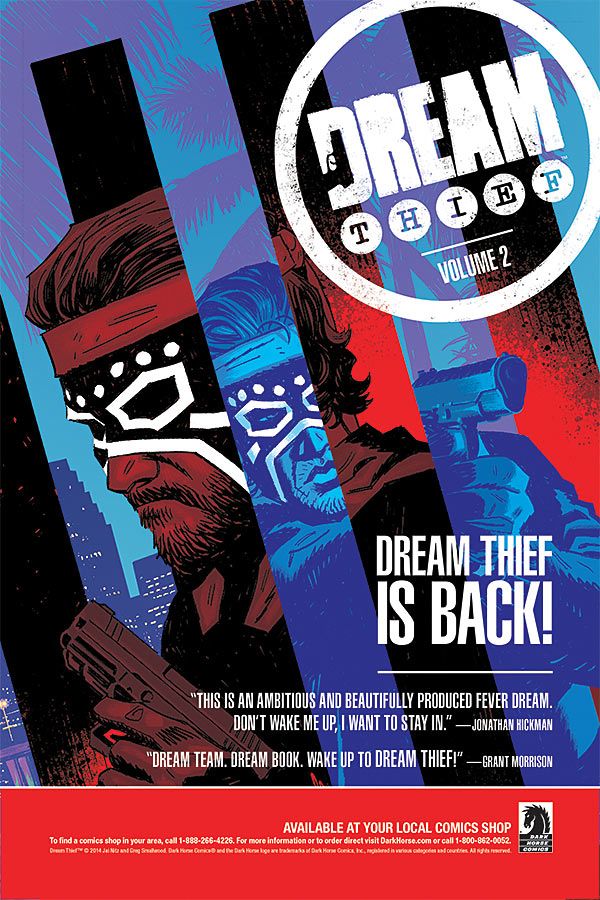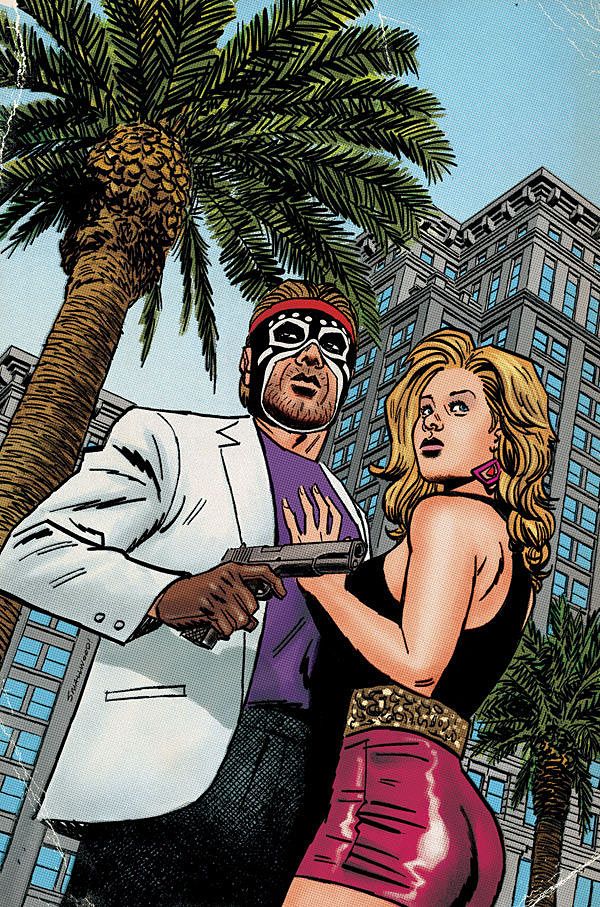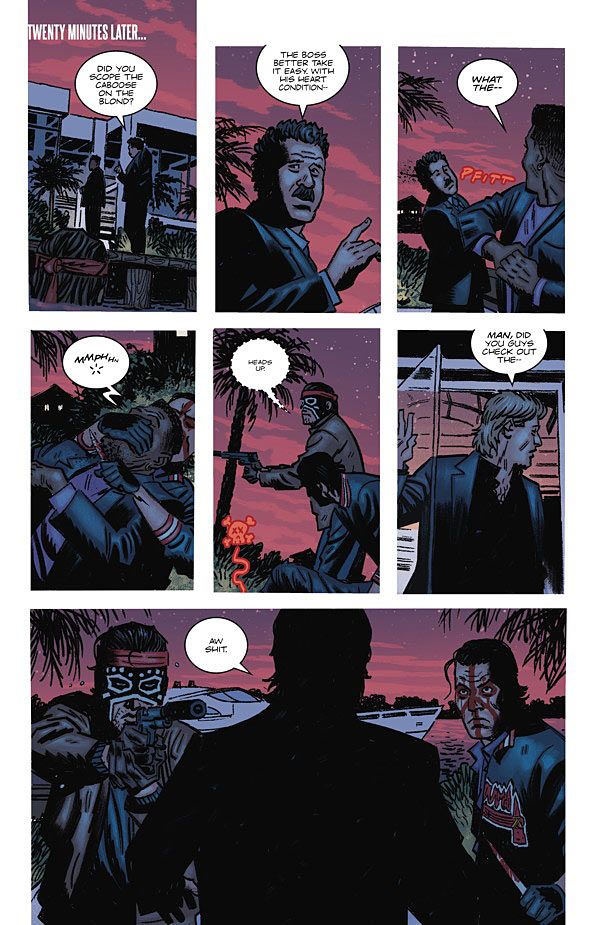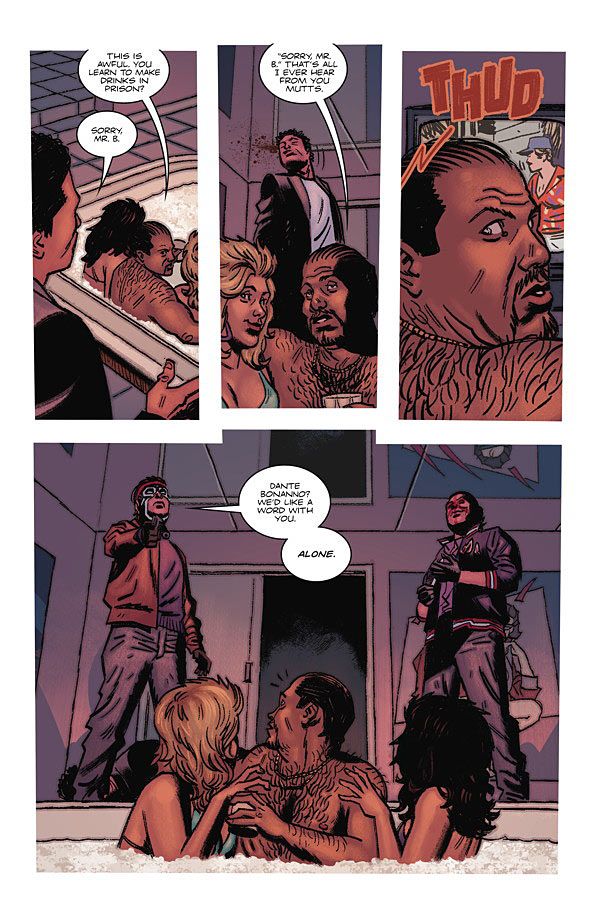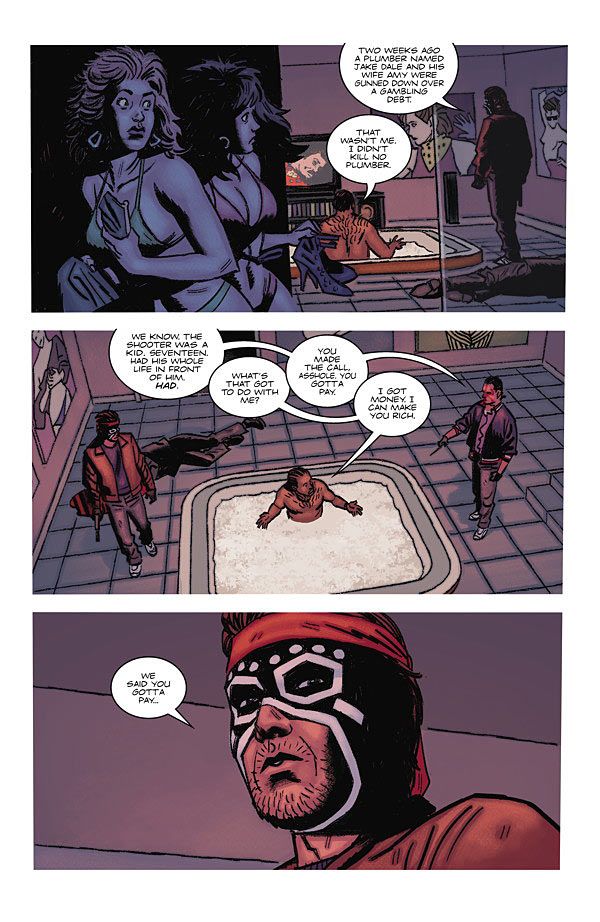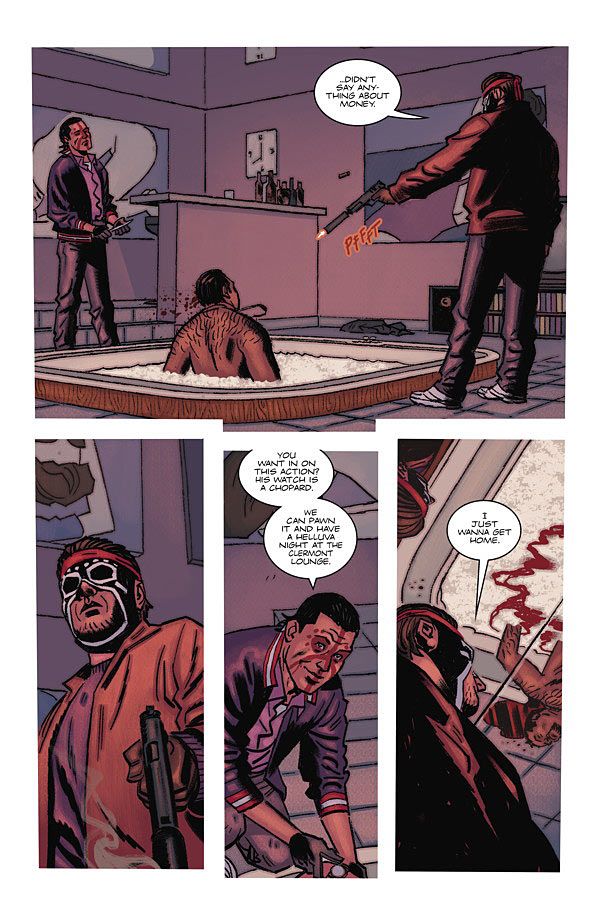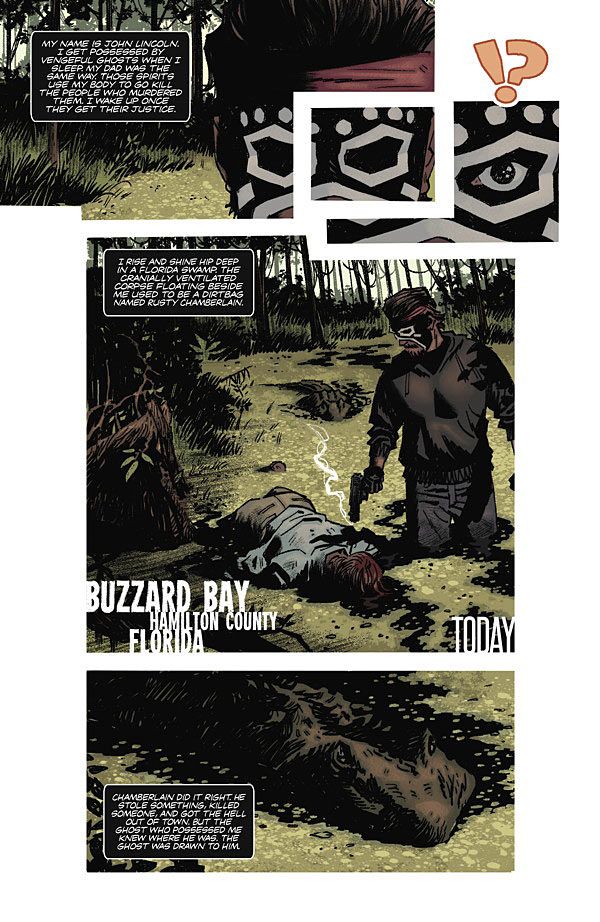Jai Nitz has been working in the comics industry for over a decade, so it may be a surprise to some that he recently delivered his breakout series. But that's exactly the kind of talk the Dark Horse published "Dream Thief" inspired.
Created with newcomer artist Greg Smallwood, the five-issue series drew attention from readers late last year for its mix of superhero tropes and hard-nosed crime storytelling. For Nitz, a writer known for work-for-hire gigs such as the all-Spanish issue of DC's "Blue Beetle" and a lengthy run on Dynamite's "Green Hornet" comics, the response to "Dream Thief" was a vindication for his creator-owned ambition. Now, Dark Horse is releasing a sequel series in June's "Dream Thief: Escape," which reteams Nitz and Smallwood to continue the mysterious story of a man who finds himself possessed by the vengeful ghosts of murder victims whenever he sleeps.
CBR News spoke with Nitz about the journey of the series, and the writer described his growing collaboration with Smallwood (who since this interview was conducted was nominated for the Russ Manning Award for Promising Newcomer), how earning a second series has upped their creative ambition, what a prison break storyline does to unify the second story and how they have plans for a long run of "Dream Thief" for the future.
CBR News: Jai, I know that "Dream Thief" is a book you've put a lot of energy into over the past year, and it seems to have paid off with the arrival of the second series "Escape." What's the overall journey of making this book happen been like for you?
Jai Nitz: What I like to remind people of when I talk about "Dream Thief" is that it's Greg's first work. Greg had never drawn comics before this. When the first series came out, he handled pencils, inks, letters and colors on every page, having never done a comic before -- that's amazing. I've had artists coming up to me saying, "Who is this guy? Where did you find him? How old is he?" [Laughs] They're all very concerned with how old he is. I think if I said "22," they'd all jump off a bridge. And when I say that artists are asking, I mean people like Dave Johnson. He's telling me, "I want to meet this guy and know what he's all about." And when a guy who is one of the best cover artists in comics was fawning over Greg, I knew we were working on something special with this book.
No one really knew who we were when "Dream Thief" came out. You and I have known each other for ten years maybe, and a lot of people in comics have known me that long, but when they'd ask me, "Jai, what is your signature work?" I didn't have one. I didn't have something that was my thing to hang my hat on -- a comic I could point to and say, "I did that." A lot of guys I know, who are lesser known writers and artists, you can still look at their work and say, "He did that" or "She did that -- that's a fine comic. I want to see more of that." And I never had that. It was something where I felt when the book was going to press like, "This is my last shot. If this book doesn't do well, I don't know what I'm doing or know anything about comics." But it did well! Dark Horse was super surprised with how well it did considering that Greg had never done a comic at all and I didn't have any signature hit that they could put a lot of heat behind. They just knew the book was good, so they put it out there. Now that it's done well, everyone at Dark Horse is saying, "Thank God this book we liked did well, so now we can do more." The people over there have been great.
It's good to be vindicated that way. I knew the book was good, and I knew Greg was amazing. I felt like it would strike a chord with readers when it came out, and it did. But the main people it struck a chord with were reviewers and other pros. And while that felt really good, I want it to sell better too. If it sells better, then we get to keep doing it. That's the main thing I'm concerned with now. It's also important to me that we spent a lot of time working on that first series. We took time developing it, making it the right comic and then hooking up with Dark Horse to shepherd it into the limelight. It took a very long time to put that book together. But also, I stand by the final product.
Has that success impacted how you approach the book stepping into a second series? The first mini was all about introducing this idea that John Lincoln is a Dream Thief -- someone who takes on the memories and abilities of the recently murdered while he sleeps in order to avenge them -- in the most entertaining way possible. Now that that's under your belt, how does the series evolve?
A really good example of how we're approaching this is the TV series "Justified." That show started out with a first season that was a little bit choppy because there were one-and-done stories that built to a larger story as it went. It introduced you to the characters and their world and how they did things. Then, Season 2 was just a long story -- one long narrative with very few one-and-dones in the way. That's the model we've adopted. We feel like if you come into "Dream Thief: Escape," we've set up who the characters are already, and so we don't hold your hand for the rest of the book. This isn't "murder of the week." It's a bigger story we want to tell that has one big narrative flow to it. It happens to go over four chapters rather than have issue #1 as a complete story, then #2 as a complete story, and so on. You need to read the whole four-issue series to get the big story we're trying to tell, which feeds of that original five-issue series. We wanted to say, "Okay, you understand the premise. Now we can get into the deep end of the pool and do some real swimming instead of floating on our backs."
I think what's great is that Greg is such a good partner that he wants to push every aspect of the story, the art, the reader experience forward. It's great to work with someone like that because a lot of the time I'll second guess myself. "Do we need to explain that more?" I'm very much on the side of caution, and he's always saying, "But is that the best story?" And we'll both know that it's not, but I'm the one sitting there going, "What if someone picks up 'Dream Thief: Escape' #3 as their first comic ever?" But you know what? Screw that guy. If he picks it up and doesn't realize that he should have read what came before, he's lost. I want people who want to be super-rewarded by reading this series. My focus is on creating a great macro story where at the end you'll go, "Damn, these guys know what they're doing." A lot of that takes away the timidness of the writing, and Greg doesn't have any timidness. So the evolution is just us jumping into that deep end.
Story wise, John seemed to have a solid grasp on his abilities at the end of the first series, but now we're facing a story called "Escape." What does that signify, and how do you complicate his status as a Dream Thief here?
The subtitle "Escape" is there because we found out at the end of the first series that the letter John received from his dad came from prison, which set up that these powers would inevitably lead John down a dark path. We also learned that his father was also a Dream Thief, but he got murdered himself. When that happened, his dad possessed another Dream Thief he knew, and so now he's stuck in that guy's body in prison. As Claremont-ianly convoluted a that may sound, it makes sense when you read the comic. [Laughs] Now in this series, John is on a mission to break out the body that his father is trapped in so he can get his revenge and move on to the cosmic sweet by-and-by.
So the subtitle is literally about escaping from prison, but it's also about escaping the shackles of man-made justice versus cosmic justice. That's something I wanted to talk about from the beginning of this book. Real world justice is different than cosmic right and wrong. We all know that, but we don't like to talk about it very much. I want to put the characters in a conflict where they have to address this so I can get stuff off my chest in the fiction rather than yelling on a blog post or whatever. [Laughs] It's a healthy way to exercise my demons rather than screaming about it on Facebook.
We've also got a supporting cast involved in the form of John's sister and his best friend. I'm not sure if their roles make for ticking time bombs or something that's more immediately complicated, but how do you pull them into this prison story?
They're both slow boil stories, but you're absolutely correct that they're both time bombs. Their roles are germane to the ongoing evolution of the character, and both of them factor into future stories we'd like to tell. Greg and I have pretty much worked out the entire series at this point. We know exactly how far we'd like to take this and what turns the characters will have when they succeed or die or betray or are betrayed. That exists for every character, and both the characters you mention -- John's sister Jenny and his best friend Reggie -- are caught in different aspects of the story. Jenny is a cop, so she is textually all about man-made justice. Meanwhile, Reggie as a best friend is this guy who's always been putting up with John's status as a slacker, and now he's in a position where the slacker has abandoned all the goofball qualities that meant he had to be babied. Now he still has to be babied in certain ways, but he's also got a super serious purpose for his life.
That's another question I love to engage in the book. We've all had friends you've been around for 20 or 30 years, and they've always been a certain way, but then they'll kind of change when you're away from them for a minute. You're like, "What the hell happened to that guy? Now he's Batman! He's serious and driven when he used to be kind of a goofball." I love that idea, and I love talking about it because we can all relate to it. We've all had a friend that makes a complete change, or maybe we've been the person who changes. I think readers can respond to it, and when you think of a situation where your best friend has made a change where he now murders people all the time...well, that can't end well for either of you. We know that from the get go, even if we want it to end well. But what we want and what we get are two different things.
You started by talking about all the prep time and early steps you and Greg took to launch the original "Dream Thief" series. It sounds like this book is not only more ambitious but is also hitting the ground running. How has the collaboration changed to meet that?
There is a drastic amount of shorthand between the two of us now. It's not like I'm writing in Marvel style or anything, but I'll write knowing full well that Greg will go in and change something on me. He has full autonomy to rearrange panels or change the sequence and say, "I don't like how this guy comes off in this scene" or "I thought this series of panels didn't make for as strong a page turn, so I moved it and I need you to come up with something else over here." We bat stuff back and forth all the time.
A lot of the time, it's a huge mistake for the writer to see his artist as just a pair of hands. "You're there to bring the realization of my vision." But it's another thing to say that they're a strong enough storyteller to do whatever you want on the page. And that's kind of where we're at. We're far along enough that I think Greg is extremely astute at what he brings to the table. And since I want to make the book as good as it can be, a lot of time that means murdering my own baby, so to speak. I might feel really proud of a line of dialogue or a sequence, but if it doesn't fit the overall context, it's got to go. With a creator-owned book, we do have editors at Dark Horse who are very capable, but what they've said is that the content is our purview. They are not editing for content and saying, "Maybe it would be better if you changed this or that." It's really up to Greg and I, and we bat things back and forth until we get it right. He literally just sent me pages for the most recent issue, and we changed the last pages dialogue four times. A lot of writers would be aghast at that. "How dare you?!?" But if Greg's making it better, I don't care. My ego has to go right out the window, and that's where we're at.
"Dream Thief: Escape" #1 ships June 25 from Dark Horse Comics.

